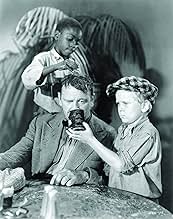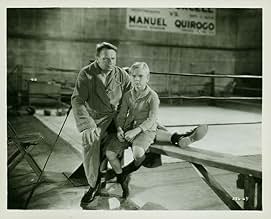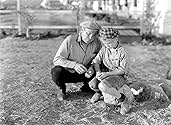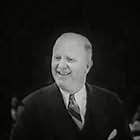IMDb RATING
7.2/10
3.8K
YOUR RATING
An alcoholic ex-boxer struggles to provide a good living for his son.An alcoholic ex-boxer struggles to provide a good living for his son.An alcoholic ex-boxer struggles to provide a good living for his son.
- Won 2 Oscars
- 5 wins & 3 nominations total
Roscoe Ates
- Sponge
- (as Rosco Ates)
Dannie Mac Grant
- Boy Taunting Dink
- (uncredited)
Frank Hagney
- Manuel Quiroga - Mexican Champ
- (uncredited)
Dell Henderson
- The Doctor
- (uncredited)
Tom McGuire
- Los Angeles Promoter
- (uncredited)
Walter Percival
- Los Angeles Promoter
- (uncredited)
Lee Phelps
- Louie - the Bartender
- (uncredited)
Andy Shuford
- Boy at Racetrack
- (uncredited)
Dan Tobey
- Ring Announcer
- (uncredited)
Featured reviews
Yes we've seen it thousands of times, but each time is a wonderful experience. You know the story by heart, but you discover new things again and again. This film is King Vidor in all his glory. Fantastic photography, great shots. For a film of 1931, it's crazy how the image remains beautiful.
The story is gripping and the acting is superb even though at times over the top.
Deserves to be shown and watched again and again.
THE CHAMP feels like a quintessential Depression movie: it captures the poverty, pessimism, and sense of desperation so many experienced during that period. Beery and Cooper's father-son relationship is highly touching, and the latter's performance is one for the ages. Cooper's character is a child forced into an adult role due to his father's alcoholism and the hardboiled, macho attitudes of the men around him, yet he still possesses the naivete and steadfast optimism only children possess. It's a complex role for a kid to nail down, but Cooper hits every note perfectly.
THE CHAMP could have easily been a soppy mess, but the gritty aesthetic and underplaying of the actors keep it from such melodramatic excess.
THE CHAMP could have easily been a soppy mess, but the gritty aesthetic and underplaying of the actors keep it from such melodramatic excess.
'The Champ' seems to have been a blueprint film for all the others of the tough-tender school that followed it, and - owing entirely to Jackie Cooper's playing perfectly off of Wallace Beery's has-been, alcoholic pug - it's perfectly charming.
Yes, the fight scene is rather hokey: had they tried to use Wallace Beery's telegraphed-the-day-before roundhouse punches, even the toe-to-toe sluggers of 'The Champ's bygone day wouldn't have survived one round in the ring. But the film isn't about the fight scene, it's about the love of father for son and son for father - and to this day 'The Champ's' story artfully delivers its soft knock-out blow with tender sucker punches and love-taps to the heart.
Compared with today's fare 'The Champ's' pacing is slow but the time taken works nicely, especially in the one-on-one scenes captivatingly played by Cooper and Beery.
There's plenty of archetypal King Vidor composition-in-frame that's still imitated today, and in many instances the lighting is exemplary of the gorgeous black & white textural artistry of Hollywood's Golden Age. Lovers of classic B&W work might want to grab more than a few frames from the DVD.
Beery's work is quite good here, but Jackie Cooper's remarkable, potent chops steal the show - and your heart; though 'The Champ' has a good many fine, classical attributes there's none better in it than Cooper's unforgettable performance.
Yes, the fight scene is rather hokey: had they tried to use Wallace Beery's telegraphed-the-day-before roundhouse punches, even the toe-to-toe sluggers of 'The Champ's bygone day wouldn't have survived one round in the ring. But the film isn't about the fight scene, it's about the love of father for son and son for father - and to this day 'The Champ's' story artfully delivers its soft knock-out blow with tender sucker punches and love-taps to the heart.
Compared with today's fare 'The Champ's' pacing is slow but the time taken works nicely, especially in the one-on-one scenes captivatingly played by Cooper and Beery.
There's plenty of archetypal King Vidor composition-in-frame that's still imitated today, and in many instances the lighting is exemplary of the gorgeous black & white textural artistry of Hollywood's Golden Age. Lovers of classic B&W work might want to grab more than a few frames from the DVD.
Beery's work is quite good here, but Jackie Cooper's remarkable, potent chops steal the show - and your heart; though 'The Champ' has a good many fine, classical attributes there's none better in it than Cooper's unforgettable performance.
The central relationship of the adoring street-wise kid (Cooper) and his devoted, boozing, gambling ex-champ Dad (Beery) is astonishing. We are observing behavior here, not acting. Cooper gives the best child performance I've ever seen and Beery is utterly human, flawed and unforgettable.
This film is full of terrific moments - comedy and heartbreak. The friendship between Cooper and his black pal is beautifully color-blind. When Cooper states, "He's colored," it's with a child's open, untainted honesty. I find King Vidor's films to always resonate with humanity and compassion. He was one of our greatest filmmakers as Frances Marion was one of our greatest screenwriters.
This film is full of terrific moments - comedy and heartbreak. The friendship between Cooper and his black pal is beautifully color-blind. When Cooper states, "He's colored," it's with a child's open, untainted honesty. I find King Vidor's films to always resonate with humanity and compassion. He was one of our greatest filmmakers as Frances Marion was one of our greatest screenwriters.
Former heavyweight champ Andy Purcell goes down to Tijuana in hopes of getting a fight. Andy's son, Dink, watches his father train, but Andy gives into his vices of gin and gambling, which constantly gets him in trouble. Andy wins Dink a race horse, which is entered in a race, where Andy meets his ex-wife Linda (with her current husband Tony) at the track and wants to be reunited with her son (Dink) and give him a better life outside of the one Andy gives him. Andy gets arrested and thrown in jail, where he decides that Dink would be best living with his mother, which devastates Dink (who idolizes his father). Andy is released from jail (thanks to Tony & Linda)and gets a bout with the Mexican heavyweight champ, where Dink runs back to his father to watch him hopefully win the fight, even though he is out of shape and not at the level of his opponent. The film is a toughing piece of cinematic brilliance, despite the static camera-work (very uncharacteristic of King Vidor). Beery and Cooper work so well together and their performances are what makes this film a classic. The script does not lose anything in the 70 plus years since its release. If the ending doesn't make you shed tears, you have to be a robot. Rating, 8.
Storyline
Did you know
- TriviaWallace Beery actually got one less vote than Fredric March in the 1931/1932 Academy Awards voting for best actor, but the rules at the time considered anyone with one or two votes less than the leader as being in a tie. So both got Academy Awards.
- GoofsAs Dink plays on the balcony awaiting his meeting with Linda, he steals chewing gum and candy for himself off of a table on the balcony. He then steals the contents of a box of cigarettes, saying that he'll "bring some home for the Champ", and stuffs them into his right jacket pocket. However, during the ride home, Andy reaches into Dink's right jacket pocket and finds cigars rather than the cigarettes which we clearly saw Dink steal.
- Quotes
[Dink compares the swanky home to his own]
Dink Purcell: The Champ and I ain't fixed up swell as this, but our joint's more lively.
- ConnectionsEdited into The Our Gang Story (1994)
- SoundtracksThe Monkeys Have No Tails in Pago Pago
(uncredited)
Composer uncertain
Sung a cappella by Wallace Beery
- How long is The Champ?Powered by Alexa
Details
- Runtime1 hour 26 minutes
- Color
- Aspect ratio
- 1.20 : 1
Contribute to this page
Suggest an edit or add missing content






































